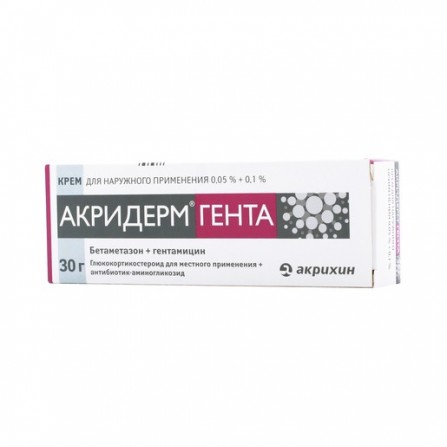Akriderm GENTA cream for external use 30 g
Condition: New product
995 Items
Rating:
Be the first to write a review!

More info
Active ingredients
Betamethasone + Gentamicin
Release form
Cream
Composition
100 g: Betamethasone dipropionate 64 mg, which corresponds to the content of betamethasone 50 mg, gentamicin (in the form of sulfate) 100 mg. Adjuvants: methyl parahydroxybenzoate - 0.2 g, propylene glycol - 21.7 g, liquid paraffin - 20 g, macrogol cetostearate - 1.3 g, ttostete, cetosterate - 1.3 g, ttostete, ctetostearate - 1.3 g, liquid paraffin - 20 g, macrogol cetostearate - 1.3 g, cetostea alcohol - 5.7 mg, disodium edetate - 0.5 g, sodium hydrogen phosphate dodecahydrate - 0.1 g, potassium dihydrogen phosphate - 0.9 g, purified water - up to 100 g
Pharmacological effect
Combined preparation for external use, providing anti-inflammatory, anti-allergic and anti-bacterial effects. Betamethasone dipropionate - GCS, has anti-inflammatory, anti-allergic, anti-exudative and antipruritic effect. It inhibits the accumulation of leukocytes, the release of lysosomal enzymes and inflammatory mediators in the focus of inflammation, inhibits phagocytosis, reduces vascular tissue permeability, prevents the formation of inflammatory edema. Gentamicin is a broad-spectrum antibiotic from the group of aminoglycosides. It has a bactericidal effect against pathogens of primary and secondary bacterial infections of the skin. Active against gram-negative bacteria: Pseudomonas aeruginosa, Aerobacter aerogenes, Escherichia coli, Proteus vulgaris, Klebsiella pneumoniae; Gram-positive bacteria: Streptococcus spp. (sensitive strains of beta and alpha hemolytic streptococcus group A), Staphylococcus spp. (coagulase-positive, coagulase-negative and some strains producing penicillinase). Inactive against anaerobes, fungi and viruses.
Pharmacokinetics
Data on the pharmacokinetics of the drug Akriderm Ghent not provided.
Indications
- dermatitis (simple and allergic), especially secondarily infected; - eczema (atopic, pediatric, monetovidnaya); - atopic dermatitis (diffuse neurodermatitis); - simple chronic lichen (limited neurodermatitis); - solar dermatitis; - exfoliative dermatitis; - radiation dermatitis ; - diaper rash; - psoriasis; - itching.
Contraindications
- skin tuberculosis; - skin manifestations of syphilis; - chicken pox; - herpes simplex; - skin post-vaccination reactions; - open wounds; - lactation period (breastfeeding); - children under 1 year of age; - hypersensitivity to the drug components.
Precautionary measures
Use in children The drug is contraindicated in children under 1 year. Children from 1 year old should be prescribed the drug only under strict indications and under medical supervision, becausepossible development of systemic side effects associated with betamethasone. When using the drug on vast surfaces and / or under occlusive viscous, suppression of the hypothalamic-pituitary-adrenal system and the development of symptoms of hypercorticism may occur, a decrease in growth hormone excretion, an increase in intracranial pressure may be observed.
Use during pregnancy and lactation
Safety of topical administration of GCS in pregnant women has not been established. Therefore, the appointment of drugs in this group during pregnancy is possible only if the potential benefits outweigh the possible risk. If you need to use Acriderm Ghent during pregnancy, you should not use the drug in high doses or for a long time. It is not established whether betamethasone is excreted with topical use of Acriderm Ghent, so if you need to use the drug during lactation, you should decide whether to stop breastfeeding.
Dosage and administration
The drug is used externally. The cream is applied with a thin layer to the affected skin area 2 times / day (morning and evening). The use of the drug is determined based on the severity of the disease. In mild cases, the cream is sufficient to apply 1 time / day; with more severe lesions, more frequent use is possible. The duration of treatment depends on the effectiveness and tolerability of therapy and is 2-4 weeks. In the absence of clinical improvement, it is necessary to clarify the diagnosis.
Side effects
Local reactions: local application of GCS can cause burning, irritation, dry skin, folliculitis, hypertrichosis, acne-like rashes, hypopigmentation, perioral dermatitis, allergic contact dermatitis. With prolonged use, as well as with the use of occlusive dressings - maceration of the skin, secondary infection, skin atrophy, prickly heat, purpura. Systemic reactions: when applied to extensive body surfaces, mainly in children, systemic side effects of GCS (hyperglycemia, glycosuria, reversible inhibition of the function of the adrenal cortex, manifestations of Cushing's syndrome) and gentamicin (nephrotoxic and ototoxic effect).
Overdose
Acute overdose is unlikely, however, with excessive or prolonged use of the drug, chronic overdose is possible, accompanied by signs of hypercortisolism: hyperglycemia, glycosuria, reversible suppression of the adrenal cortex function, manifestations of Cushing's syndrome. In the case of chronic toxic effects, a gradual withdrawal of the drug is recommended.
special instructions
If there are signs of hypersensitivity or skin irritation associated with the use of the drug, the treatment should be stopped and the patient should be treated with adequate therapy. With prolonged treatment, if the drug is applied to large surfaces of the skin, using occlusive dressings, as well as children, systemic absorption of GCS is possible. skin of the face more often than on other surfaces of the body, after prolonged treatment of GCS for local use, atrophic changes may occur. The course of treatment in this case should not exceed 5 days. Acreterm Ghent is not intended for use in ophthalmology. Contact with the drug should be avoided. With prolonged use of the drug, it should be discontinued gradually. Use in pediatrics For children from 1 year, the drug is prescribed only according to strict indications and under medical supervision, because possible development of systemic side effects associated with betamethasone. When using the drug on vast surfaces and / or under occlusive viscous, suppression of the hypothalamic-pituitary-adrenal system and the development of symptoms of hypercorticism may occur, a decrease in growth hormone excretion, an increase in intracranial pressure may be observed.




